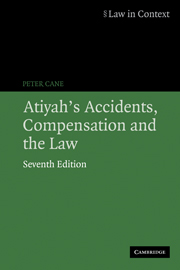Book contents
- Frontmatter
- Contents
- Preface
- List of abbreviations
- List of tables
- Table of legislation
- Table of cases
- Part One The Issues in Perspective
- Part Two The Tort System in Theory
- Part Three The Tort System in Operation
- Part Four Other Compensation Systems
- Part Five The Overall Picture
- 15 A plethora of systems
- 16 The cost of compensation and who pays it
- 17 The functions of compensation systems
- Part Six The Future
- Index
17 - The functions of compensation systems
Published online by Cambridge University Press: 05 June 2012
- Frontmatter
- Contents
- Preface
- List of abbreviations
- List of tables
- Table of legislation
- Table of cases
- Part One The Issues in Perspective
- Part Two The Tort System in Theory
- Part Three The Tort System in Operation
- Part Four Other Compensation Systems
- Part Five The Overall Picture
- 15 A plethora of systems
- 16 The cost of compensation and who pays it
- 17 The functions of compensation systems
- Part Six The Future
- Index
Summary
Compensation
Some preliminary questions
So far in this book the word ‘compensation’ has been used loosely and in various contexts. We must now consider more carefully what is meant by the term, and ask why we compensate the victims of injury and disease. One possible answer to this second question is that widely held notions of justice and fairness demand it. Unfortunately, however, we have very little evidence concerning what people think about compensation for death and personal injury. Attempts have sometimes been made to ascertain common views by survey questionnaires, but the results are not particularly helpful. One writer concludes that ‘there seems to be rather little evidence that when asked, people actually do express consensus support for a faultbased compensation system’. Several (now rather old) surveys found that an overwhelming proportion of those questioned were in favour of damages being awarded for pain and suffering; but when it is appreciated that those questioned were themselves recent victims of road accidents, what is surprising is not the majority of affirmative replies, but the substantial minority who did not favour such awards – some 20% in one and around 30% in another. One US survey devoted to pain and suffering found widespread misunderstanding about the way damages are calculated and about the likelihood of receiving damages for pain and suffering. In England, a former trade union claims official once said that people injured in industrial accidents sometimes ‘can hardly be convinced’ that they are entitled to claim disablement benefit when they have suffered no loss of earnings.
- Type
- Chapter
- Information
- Atiyah's Accidents, Compensation and the Law , pp. 408 - 458Publisher: Cambridge University PressPrint publication year: 2006

